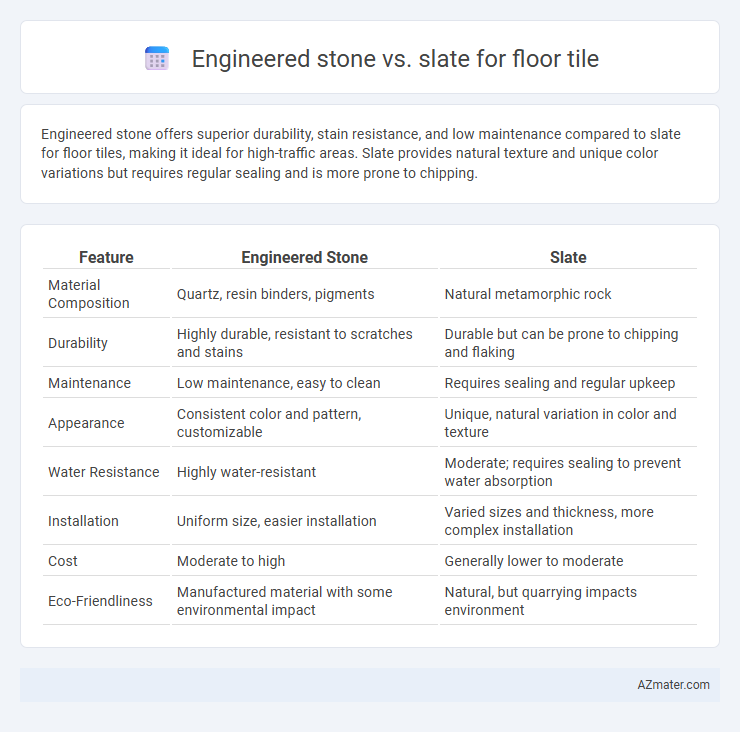Engineered stone offers superior durability, stain resistance, and low maintenance compared to slate for floor tiles, making it ideal for high-traffic areas. Slate provides natural texture and unique color variations but requires regular sealing and is more prone to chipping.
Table of Comparison
| Feature | Engineered Stone | Slate |
|---|---|---|
| Material Composition | Quartz, resin binders, pigments | Natural metamorphic rock |
| Durability | Highly durable, resistant to scratches and stains | Durable but can be prone to chipping and flaking |
| Maintenance | Low maintenance, easy to clean | Requires sealing and regular upkeep |
| Appearance | Consistent color and pattern, customizable | Unique, natural variation in color and texture |
| Water Resistance | Highly water-resistant | Moderate; requires sealing to prevent water absorption |
| Installation | Uniform size, easier installation | Varied sizes and thickness, more complex installation |
| Cost | Moderate to high | Generally lower to moderate |
| Eco-Friendliness | Manufactured material with some environmental impact | Natural, but quarrying impacts environment |
Introduction to Engineered Stone and Slate Flooring
Engineered stone flooring is composed of natural quartz combined with resin and pigments, offering high durability, stain resistance, and a consistent appearance ideal for modern design. Slate flooring, a natural metamorphic rock, features unique, textured surfaces with varying colors that provide rustic charm and excellent slip resistance. Both materials suit different aesthetic preferences and practical needs, with engineered stone excelling in uniformity and maintenance, while slate delivers natural variation and traditional appeal.
Composition and Manufacturing Process
Engineered stone is composed of approximately 90-95% crushed natural quartz combined with resins and pigments, creating a durable, non-porous surface through a highly controlled manufacturing process involving vibration and compression. Slate is a natural metamorphic rock formed from shale subjected to heat and pressure, cut directly into slabs without artificial additives, preserving its natural cleft texture. The manufacturing of engineered stone allows for consistent color and pattern, while slate's production relies on quarrying and splitting, resulting in unique variations in each tile.
Aesthetic Appeal and Design Versatility
Engineered stone offers a highly customizable aesthetic appeal with consistent color patterns and finishes that mimic natural stone, providing sleek and modern design options for floor tiles. Slate, with its natural textures, color variations, and rustic charm, enhances spaces with unique, earthy character but offers less uniformity compared to engineered stone. While engineered stone excels in design versatility through a wide range of colors and patterns, slate's appeal lies in its authentic, rugged beauty suited for traditional and rustic interiors.
Durability and Longevity
Engineered stone offers superior durability due to its composition of crushed natural stone bound with resin, making it highly resistant to scratches, stains, and impacts compared to slate. Slate, a natural metamorphic rock, provides good longevity but is more susceptible to chipping and requires regular sealing to maintain its strength and appearance. Both materials offer long-lasting flooring options, but engineered stone's consistent manufacturing process ensures enhanced resistance to wear and environmental factors over time.
Maintenance and Cleaning Requirements
Engineered stone floors exhibit high resistance to stains and scratches, requiring minimal maintenance with regular sweeping and occasional mopping using pH-neutral cleaners. Slate tiles demand more intensive care due to their porous nature, necessitating sealing every 1-2 years to prevent moisture infiltration and staining, alongside routine sweeping and damp mopping. Both materials benefit from prompt spill cleanup, but engineered stone offers superior durability and lower upkeep costs over time.
Water and Stain Resistance
Engineered stone offers superior water and stain resistance compared to slate due to its non-porous surface, making it an ideal choice for high-moisture areas like kitchens and bathrooms. Slate, being a natural stone with inherent porosity, requires regular sealing to prevent water absorption and staining, which can lead to discoloration and damage over time. The dense composition of engineered stone also resists common household chemicals and spills more effectively than slate, ensuring long-lasting durability and easy maintenance.
Cost Comparison and Value
Engineered stone floor tiles typically cost between $50 to $100 per square foot, offering a durable and low-maintenance option with consistent appearance. Slate tiles range from $10 to $30 per square foot but may incur higher long-term maintenance costs due to their natural porous surface and potential for chipping. While slate offers natural aesthetic appeal and lower upfront cost, engineered stone provides greater value over time through durability and reduced upkeep expenses.
Installation Process and Considerations
Engineered stone floor tiles offer a more straightforward installation process due to their consistent thickness and uniform size, allowing for easier cutting and fitting compared to slate. Slate requires careful handling during installation because its natural cleft surface and varying thickness necessitate skilled labor to ensure proper alignment and stability. Both materials demand a moisture-resistant substrate and appropriate sealing, but engineered stone typically requires less maintenance and fewer post-installation adjustments.
Environmental Impact and Sustainability
Engineered stone floor tiles, typically made from a mixture of natural quartz and resins, offer durability but often involve energy-intensive manufacturing and non-biodegradable components. Slate, a natural metamorphic rock, is mined directly from quarries with minimal processing, reducing its carbon footprint and enhancing its sustainability as a long-lasting, recyclable material. Choosing slate supports eco-friendly flooring solutions due to its natural origin and lower environmental impact compared to engineered stone.
Best Applications: Which Flooring Suits Your Space?
Engineered stone offers superior durability and stain resistance, making it ideal for high-traffic areas and kitchens where moisture and heavy wear are common. Slate, known for its natural slip resistance and unique texture, excels in entryways and bathrooms where both safety and aesthetic appeal matter. Choosing between engineered stone and slate depends on your space's functional needs and desired design, with engineered stone favored for modern, low-maintenance floors, and slate preferred for rustic, tactile environments.

Infographic: Engineered stone vs Slate for Floor Tile
 azmater.com
azmater.com